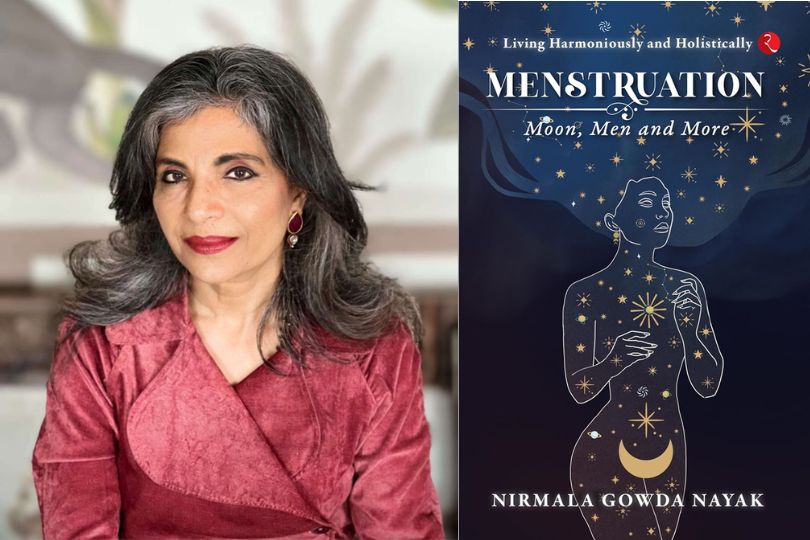Interview with Nirmala Gowda Nayak Author “Living Harmoniously and Holistically MENSTRUATION Moon, Men and More “
Explore Nirmala Gowda Nayak's insights in her book "Living Harmoniously and Holistically: Menstruation, Moon, Men, and More" in this exclusive interview.on Oct 23, 2024

Nirmala Gowda Nayak, founder of Nimmi’s Mantra Foundation and a founding member of World of Women (WOW), champions menstrual health education and women’s empowerment through yoga and emotional well-being workshops. She has led numerous outreach programmes, especially in rural areas, dedicated to educating underprivileged girls and women. Her practical guide Rutu Chakra delves into strategies for menstrual hygiene management and comprehensive health and nutritional interventions.
Beyond her professional realm, Nirmala is a holistic counsellor, chakra therapist, meditator and Tarot master. She is also a mother, former beauty queen and model, epitomizing sustainable fashion and ethical living while advocating for eco-friendly practices.
Frontlist: Your book challenges the societal stigma around menstruation. What motivated you to write this book, and why do you think it's crucial to address this issue today?
Nirmala: My motivation to write Menstruation, Moon, Men, and More stems from personal experience and a desire to shift perceptions around the deep-rooted stigma and rituals associated with menstruation. Menstrual health is a key aspect of women’s overall well-being. After years of researching and practicing holistic methods to balance body and mind and noticing the lack of open dialogue on this subject, I felt compelled to empower women and girls with knowledge. This book not only provides insights into menstrual health but also offers simple, meaningful rituals for mothers and daughters to embrace their inner goddess power. By fostering these conversations, we can help shift outdated perceptions and create a more supportive, understanding community.
Frontlist: The title, Moon, Men and More, is intriguing. How do the moon and men relate to menstruation in your book, and what message do you hope to convey through this symbolism?
Nirmala: The title Menstruation, Moon, Men, and More is meant to reflect the interconnectedness of cycles, feminine energy, and awareness. The moon, symbolic of feminine energy in many cultures, aligns with the natural rhythms of menstruation. In my book, I explore how understanding and embracing this connection can empower women to reclaim their inner strength. 'Men' are included in the title because it's vital to involve them in the conversation—menstruation impacts not just women but everyone around them. By breaking the silence and fostering education, we can create a supportive environment that respects and understands menstruation, benefiting society as a whole. Through this symbolism, I hope to inspire a shift in perception, viewing menstruation as a natural and empowering process.
Frontlist: You emphasize involving men in the conversation about menstrual health. How can men become better allies in this movement, and what role do they play in breaking menstrual taboos?
Nirmala: Nearly half of the world’s population is male, yet many men have limited knowledge about menstruation. It’s crucial that men step forward, acknowledge, and support women by helping to break the stigma and taboos surrounding the female body. Men can be powerful allies in this movement by respecting and recognizing that a woman’s role is just as significant as a man’s in our shared existence. In a society still shaped by patriarchal norms, where men hold key positions from grassroots to constitutional levels, it’s essential to make a conscious effort to include men in these conversations actively. Their involvement drives change and creates a more balanced, cooperative world.
Frontlist: Your book covers both the physical and emotional aspects of menstruation. How did you ensure a balanced approach to these two intertwined facets?
Nirmala: In writing Menstruation, Moon, Men, and More, I wanted to emphasize that mental health is just as important as menstrual health. The two are deeply intertwined, as the emotional well-being of a woman can influence her physical experience of menstruation and vice versa. To ensure a holistic approach, I drew upon my research into balancing both body and mind. The book offers practical tools—ranging from self-care rituals to mindfulness practices—that nurture both the physical and emotional aspects of menstruation. By addressing mental and menstrual health together, we can empower women to approach their cycles with greater self-awareness, compassion, and strength.
Frontlist: You've worked extensively in rural areas. What was your experience like, and how did those experiences shape the content of your book?
Nirmala: My experiences working in rural areas have shown me the vast differences between how menstruation is perceived and addressed in rural and urban settings. While rural communities often face challenges related to access and education, urban women tend to grapple with the pressures of fast-paced, goal-driven lifestyles. Menstruation, Moon, Men, and More is particularly geared toward urban women, who often prioritize external achievements over their inner well-being. This book serves as a reminder to slow down, reconnect with their bodies, and embrace the natural rhythms of menstruation, offering a more mindful approach to self-care and empowerment.
Frontlist: What were some of the challenges you faced while writing this book, particularly in conveying sensitive topics to a broad audience?
Nirmala: One of the key challenges I faced while writing Menstruation, Moon, Men, and More was addressing such a sensitive topic in a way that would resonate with a broad audience. My goal was to present the facts without judgment or blame, ensuring inclusivity rather than pointing fingers at any religion, gender, or tradition. It was important to acknowledge that rituals surrounding menstruation were relevant in their time, but as society evolves, so must our practices. I aimed to gently encourage readers to adopt those rituals that support both body and mind while recognizing that many aspects of our lives have changed across generations. The message is about embracing what empowers us without shaming or disregarding past traditions.

.jpg)
.jpg)
.jpg)
.jpg)
.jpg)

.jpg)
.jpg)
.jpg)
.jpg)
.jpg)

.jpg)
.jpg)











Sorry! No comment found for this post.